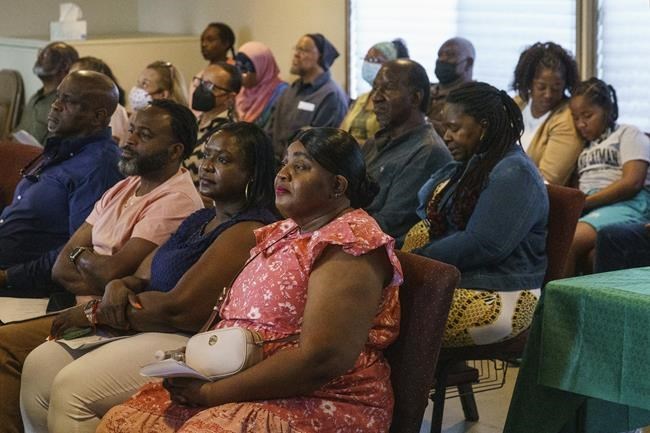
FILE - Descendants of Palm Springs Section 14 residents, front row from left, Durran Jamison, Jarvis Crawford, Janell Hunt, and Taunya Harvey gather at the United Methodist Church in Palm Springs, Calif., Sunday, April 16, 2023. (AP Photo/Damian Dovarganes, File)
November 15, 2024 - 10:15 AM
PALM SPRINGS, Calif. (AP) — A Southern California city will pay $5.9 million to compensate Black and Latino families who were displaced from a neighborhood in the 1960s and decades later led a fight for restitution.
The Palm Springs City Council approved the deal in a unanimous vote Thursday. The council also approved $10 million for a first-time homebuyer assistance program, $10 million for a community land trust and the creation of a monument commemorating the history of the neighborhood known as Section 14.
Mayor Jeffrey Bernstein earlier this week said the city is “taking bold and important action that will create lasting benefits for our entire community while providing programs that prioritize support for the former residents of Section 14.”
It has not been determined how much each family or individual would receive in direct compensation, attorney Areva Martin said earlier this week. Martin represents over 300 former residents and hundreds of descendants. Money for housing assistance would go toward low-income Palm Springs residents, with priority given to former Section 14 residents and descendants.
Section 14 was a square-mile neighborhood on a Native American reservation that many Black and Mexican American families once called home. Families recalled houses being burned and torn down in the area before residents were told to vacate their homes.
The city council voted in 2021 to formally apologize for the city's role in the displacement. Families filed a tort claim with the city in 2022, and the following year announced they were seeking $2.3 billion for the harm caused by their displacement.
The tort claim argued the tragedy was akin to the violence that decimated a vibrant community known as Black Wall Street more than a century ago in Tulsa, Oklahoma, leaving as many as 300 people dead. There were no reported deaths in connection with the displacement of families from Section 14.
News from © The Associated Press, 2024